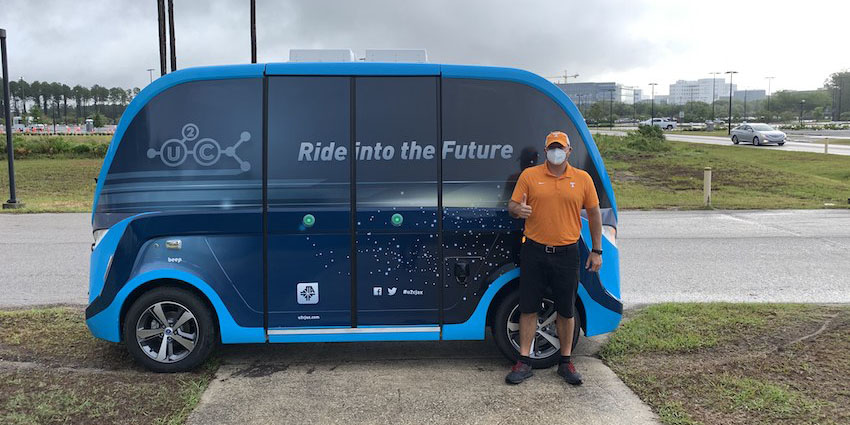For the first time in the United States, autonomous vehicles are helping with the effort against COVID-19. On March 9, 2020, the Jacksonville Transportation Authority (JTA) rolled out a fleet of four autonomous vehicles to transport coronavirus test specimens across the Mayo Clinic campus in Jacksonville, FL. One of the key leaders in the project is Michael Feldman, a 2019 graduate of the Executive MBA for Global Supply Chain at the University of Tennessee, Knoxville’s Haslam College of Business. “I think it’s been extremely critical to relieve the healthcare workers,” says Feldman. “This allows them to do what they’re skilled and trained to do, which is protect the community and protect themselves.”
Feldman is the Director of Autonomous Vehicles at the JTA’s Ultimate Urban Circulator (U2C), an innovative, large-scale program to introduce the first fleet of autonomous vehicles (AVs) in public transportation. It’s part of an extensive plan to overhaul mass transit in downtown Jacksonville. Feldman regularly oversees design, administration, and budgeting for the U2C, but as the pandemic grew in severity, the JTA conceived of this special venture with Mayo Clinic.
“I do believe it is kind of a moral obligation,” says Feldman. “I don’t feel that I would have been in a good place, sitting at home and not actively in the fight trying to do something to help, regardless of the scale.”
Considering the unprecedented nature of the project, the scale was significant. The AVs operate under Level 4 autonomy (no human beings onboard) to travel a one-mile route (about 5 minutes), transporting an average of 90 to 100 specimens each day, about five days a week. Although Autonomous vehicles are not yet permitted on public roadways, Mayo Clinic’s private campus allows these AVs to operate on thoroughfares alongside regular traffic. The AVs are outfitted with a suite of sensors that allow them to operate safely with other drivers. The JTA set up a mobile command center next to the pull-up tent where testing occurs, and JTA employees travel on micromobility electric scooters alongside the vehicles on their route. All to ensure, as Feldman says, “safety and efficiency and all of those different metrics that we hold dear.”
The JTA internal team worked closely with Beep (a purveyor of AV technology headquartered in Orlando) and NAVYA (the vehicle supplier) to bring the whole idea together in just seven days. The push to get the project live often forced Feldman and his colleagues to work until four in the morning. “It was important to get it right the first time,” Feldman says. “Blood, sweat—no tears, nobody cried—but nights of blood and sweat there to pull that off, so we were very humbled. We are known as a division that can, you know, continue to push the envelope and push the industry in a certain direction.”
Feldman has a unique technological background for this kind of work, from robotics at Amazon to service as a U.S. Army Military Intelligence Officer and civilian pilot. As with any government project, strong budget management was vital to continued success, and Feldman appreciated the valuable emphasis Haslam’s EMBA-GSC placed on the finance space. “I think the EMBA was critical,” he says. “Not just understanding a P&L, but understanding the impact of managing a substantial budget. All the projects that were associated within the financial accounting space were super, super powerful.”
Feldman also notes how training in supply chain management with a customer-first perspective was particularly useful for the AV specimen-transportation project. “Taking that same supply chain focus to this particular effort has really dialed in on that customer focus,” he says. “Really partnering with the Mayo team to understand what their needs are, which has been very successful in terms of leveraging this technology.”
The success at Mayo Clinic is emboldening for those working in the autonomous vehicle space across the country. And the U2C program at large has received several grants, including $12.5 million from the federal Department of Transportation’s prestigious BUILD grant. Feldman hopes that others will see what JTA has been able to accomplish at Mayo Clinic and be inspired to innovate. “We’re going to have to think of very out-of-the-box ways to be innovative, to get acclimatized to the new ways of life.”
“My personal opinion,” says Feldman, “is that I think there is a use case for this type of work, leveraging this type of technology beyond the pandemic.” He emphasizes that advances in autonomous vehicle technology are moving swiftly. “This will happen. There will be vehicles on the road that will not have a person in it, and we need to get into that mindset and start being a part of this solution.”
Learn more about Haslam’s Executive MBA for Global Supply Chain.
